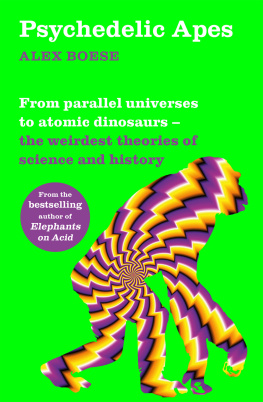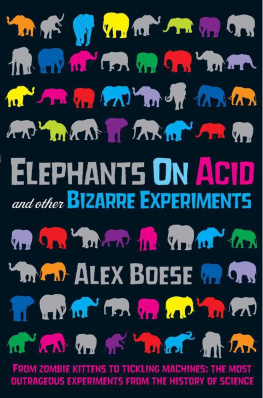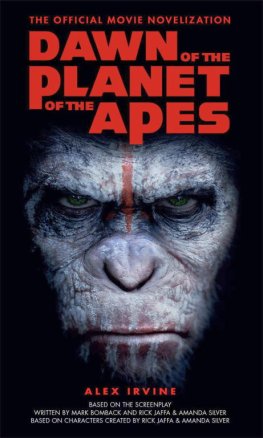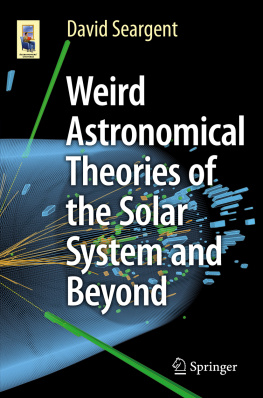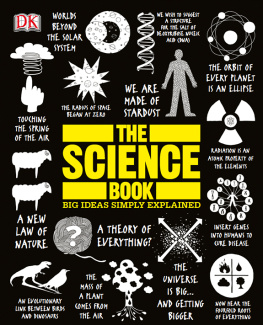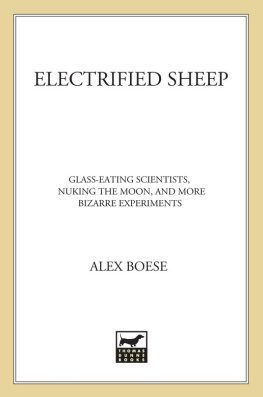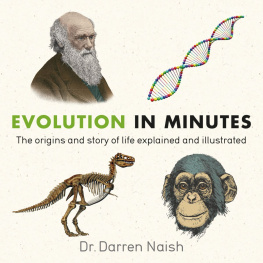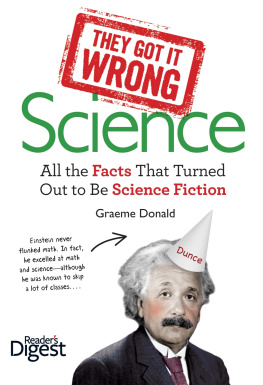The right of Alex Boese to be identified as the author of this work has been asserted by him in accordance with the Copyright, Designs and Patents Act 1988.
Pan Macmillan does not have any control over, or any responsibility for, any author or third-party websites referred to in or on this book.
You may not copy, store, distribute, transmit, reproduce or otherwise make available this publication (or any part of it) in any form, or by any means (electronic, digital, optical, mechanical, photocopying, recording or otherwise), without the prior written permission of the publisher. Any person who does any unauthorized act in relation to this publication may be liable to criminal prosecution and civil claims for damages.
A CIP catalogue record for this book is available from the British Library.
Also by Alex Boese
THE MUSEUM OF HOAXES
ELEPHANTS ON ACID
HIPPO EATS DWARF
ELECTRIFIED SHEEP
INTRODUCTION
This is a book about the weirdest, wackiest and most notorious against-the-mainstream theories of all time. In the following chapters, well explore curious questions such as, Are we living in a computer simulation? Do diseases come from outer space? What if planets occasionally explode? Is it possible the dinosaurs died in a nuclear war? Could humans be descended from aquatic apes? And was Jesus actually Julius Caesar?
Such notions may sound so outrageous that no one could possibly take them seriously, but theyre not intended as jokes. Over the years, these odd speculations have been put forward in all seriousness by scholars who have argued that, no matter how much they might challenge the conventional wisdom, they could actually be true. Mainstream scientists, of course, strongly disagree. They insist that such ideas are nonsense. Some grow quite incensed that anyone would ever propose them in the first place, let alone believe them. Nevertheless, weird theories are a persistent presence in the history of science. They seem to sprout up constantly from the soil of intellectual culture, like strange, exotic growths.
As an exploration of unorthodox ideas, this book is part of a very old genre: the history of error. The purpose of this has traditionally been to describe supposedly foolish or incorrect beliefs in order to condemn them, holding them up as examples of flawed thinking to be avoided. That, however, isnt my intention here. Nor, on the other hand, do I want to defend or endorse these weird theories. My relationship to them is more complicated. I recognize that they make outrageous claims. Im also quite willing to admit that most, perhaps even all of them, might be entirely wrong. And yet, Im not hostile to these theories. In fact, they fascinate me, and thats why I wrote this book.
On one level, Im drawn to them because of a quirk of my personality. For as long as I can remember, Ive had a preoccupation with oddities of history, especially ones involving outsiders and eccentrics. From this perspective, the appeal of these theories is obvious, because theyre all the product of peculiar imaginations. Many of their creators were legendary misfits who ended up ostracized from the scientific community because of their insistent championing of aberrant notions.
Im also intrigued by these theories because they offer a unique window into scientific culture, which is a fascinating subject in its own right. In particular, they reveal the tension between contrarianism and consensus-building that lies at its very heart.
Science is a unique form of knowledge in that it promotes scepticism about its own claims. It denies the notion of absolute certainty. It always admits the possibility of doubt, striving to put its claims to the test. For this reason, it places an enormous value on contrarianism, or being able to think different, as the famous Apple advertising slogan put it. Consider how scientific geniuses such as Copernicus, Darwin and Einstein are celebrated because they revolutionized our understanding of the natural world by seeing it in completely new ways.
But, simultaneously, science requires consensus building. It would be useless if researchers were forever disagreeing with one another, endlessly producing new rival explanations. At some point, they have to come together and accept that one interpretation of the evidence is more compelling than all the others. In other words, while science may shower its highest honours on those who can think differently, most scientists, most of the time, need to think the same way. As described by the historian Thomas Kuhn in his 1962 book The Structure of Scientific Revolutions, their jointly held interpretations, or paradigms, guide day-to-day research, shaping both the questions that get asked and the answers deemed legitimate.
So, both contrarians and consensus-builders play a necessary role in science, but, as well see, they often clash though this may be putting it too lightly. It wouldnt be an exaggeration to say that they often end up despising each other outright.
The problem, as the consensus-builders see it, is that while contrarianism has its place, it can easily be taken too far. They argue that if a paradigm is supported by overwhelming evidence, then persisting in rejecting it, preferring to promote ones own radical theory in its place, can quickly degenerate into lunacy. It becomes tantamount to rejecting science itself.
The contrarians, on the other hand, stress that there are always different ways to interpret evidence and that the evidence might even be incomplete; perhaps a crucial piece of the puzzle is missing. They warn that rigid conformity can pose a far graver threat to science, because it blinds researchers to possible new interpretations.
I find myself sympathetic to both sides in this debate. I accept that, realistically, the conventional scientific wisdom is almost certainly right. Scientists, after all, are highly trained to evaluate evidence. If it has persuaded most of them to favour one interpretation, its probably because that genuinely is the best one. But I have enough of a contrarian in me to find myself happy that the iconoclasts are out there asking awkward questions, stirring up the pot even if, at times, they may come across as totally nuts. On occasion maybe not often, but every now and then the wild, unorthodox theory that seems to defy common sense does end up being vindicated.

